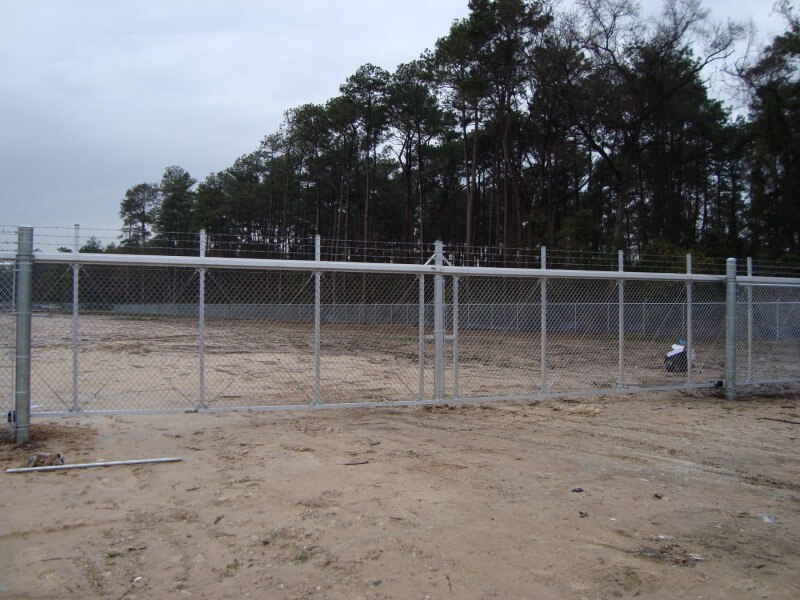Residential Chain Link Fences: Installation, Security, and Design Options
When it comes to installing a chain link fence for your home there are plenty of advantages to consider. Not does it provide security and privacy by acting as a protective barrier, but it also requires minimal upkeep and is cost effective compared to other fencing options. Moreover, chain link fences are known for their durability, versatility, and ability to withstand weather conditions. If you’re thinking about getting a chain link fence our website offers detailed information on its benefits as well as helpful installation tips and guidance.

Understanding Residential Chain Link Fences
Residential chain link fences are a choice among homeowners who want an affordable and long-lasting fencing solution. They have benefits including security measures, low maintenance requirements and diverse design options. Familiarizing yourself with the aspects of residential chain link fences will empower you to make an informed decision for your property.
One distinguishing characteristic of these fences is their construction using interconnected steel wires that form a diamond shaped pattern. These wires are often. Coated with materials like vinyl to enhance their strength while protecting against rust and corrosion.
Chain link fences come in heights ranging from three to six feet based on your specific needs. Furthermore, they can be customized further with features, like wire or privacy slats.
While chain link fences are typically known for their silver appearance modern options now provide a wide range of colors and coatings that seamlessly blend with the aesthetic of your property. This gives you the opportunity to select options that complement your landscaping or match the style of your home.
The versatile design elements of chain link fences make them suitable for applications. Whether you need to secure a backyard creates a boundary around a swimming pool or enclose a dog kennel. Residential chain link fences can be customized to meet your specific needs.
An additional notable benefit of chain link fences is their transparency. Unlike barriers they allow for visibility both inside and outside the fenced area. This can be particularly advantageous when you want to maintain a feel while still ensuring security and containment.
When considering installation, it’s important to remember that while chain link fences are relatively easy to install it is recommended to seek assistance for optimal results. Proper installation ensures that the fence remains sturdy against forces such as wind or impacts.
Ultimately understanding of the characteristics and advantages of chain link fences empowers you to make an informed decision about whether they are the right fit for your property. When deciding on a chain link fence it’s important to consider factors like height, customization choices and the level of features you might need. This way you can select a fence that not only provides security but also meets your specific requirements and looks good.
- Residential chain link fences are an affordable and durable fencing option that offer security, low maintenance, and versatility in design. They are constructed with interconnected steel wires that can be galvanized or coated with materials like vinyl for added durability. Chain link fences come in different heights and can be customized with features such as barbed wire or privacy slats. While they traditionally have a silver appearance, contemporary options offer a variety of colors and coatings to match your property’s aesthetic. These fences are versatile for various applications and provide transparency while ensuring security and containment. Professional installation is recommended for optimal results. Understanding the characteristics and advantages of residential chain link fences allows you to make an informed decision for your property, considering factors such as height, customization options, and additional features required.
Key Materials and Components
To better understand residential chain link fences, it’s essential to explore the key materials and components involved in their construction. By gaining insights into these elements, you’ll have a clearer understanding of the fence’s durability, strength, and overall quality.
The primary material used in chain link fences is galvanized steel wire. This wire is typically made from strong steel that has been coated with zinc to increase its resistance to environmental factors such as rust and corrosion. Galvanized steel wire ensures that the fence remains intact even in challenging weather conditions.
The gauge of the wire refers to its thickness, with lower numbers indicating thicker wires. Common gauges for residential chain link fences range from 11.5 to 9-gauge wires. Thicker wires offer more robustness and are suitable for areas that require enhanced security or for installations that may be subject to heavier impacts.
In addition to the wire itself, other essential components contribute to the functionality of residential chain link fences. These include line posts, terminal posts, top rails, tension bands, tension bars, and gate hardware.
Line posts are vertical supports that connect sections of the fence together, while terminal posts serve as anchor points at the corners or ends of the fence line. The top rail runs along the top edge of the fence and provides additional stability and support.
Tension bands secure the mesh fabric to line posts, tension bars help keep the fabric taut along the length of the fence, and gate hardware includes hinges and latches for proper gate installation and operation.
By familiarizing yourself with these key materials and components, you can assess the quality and durability of a residential chain link fence before making a purchase or hiring a professional installation service. Understanding these aspects will ensure that you choose a fence that not only meets your needs but also withstands the test of time.
Differentiating Traditional vs Modern Styles
Chain link fences have come a long way from their traditional and utilitarian origins. These days, you’ll find a variety of styles to choose from, ranging from the classic to the contemporary. Let’s explore the key differences between traditional and modern chain link fence styles.
Traditional Chain Link Fences: Traditional chain link fences are characterized by their simplicity and durability. They typically feature a galvanized steel wire mesh interwoven with diamond-shaped patterns. The silver-gray color of galvanized steel is often associated with these types of fences.
Picture a neighborhood park surrounded by a timeless chain link fence that allows visitors to see in and out clearly. This iconic aesthetic has become synonymous with traditional chain link fencing.
On the other hand, Modern Chain Link Fences take a more creative approach to design while maintaining the functionality of the fence. They incorporate various materials, colors, and patterns to add visual appeal and complement the surrounding landscape or architecture.
Imagine a residential property with a black vinyl-coated chain link fence that seamlessly blends into its environment. The sleek black finish adds a contemporary touch while preserving security.
Aesthetics aside, let’s now uncover some of the benefits that both traditional and modern chain link fences provide.
Benefits of A Chain Link Fence
Chain link fences offer several advantages that make them a popular choice for many homeowners and businesses alike. So, what are some of the benefits of installing a chain link fence?
- Affordability: One significant advantage is their cost-effectiveness compared to other fence options like wood or wrought iron. Chain link fences are generally more budget-friendly upfront, making them an attractive choice for those on a tight budget or looking for large-scale installations.
- Durability: Whether it’s extreme weather conditions or regular wear and tear, chain link fences are designed to withstand harsh elements. The galvanized steel or vinyl coating adds corrosion resistance, ensuring the fence remains sturdy and long-lasting.
- Low Maintenance: Unlike wooden fences that require regular staining and sealing, chain link fences are relatively low maintenance. They don’t rot, warp, or require repainting, making them a hassle-free option for homeowners looking for a low-maintenance fencing solution.
- Versatility: Chain link fences are incredibly versatile and can be customized to suit various needs. They come in different heights and gauges to provide varying levels of security and privacy. Additionally, they can be easily modified with accessories like privacy slats or decorative inserts to enhance aesthetics and functionality.
- Security and Visibility: One notable advantage of chain link fences is the balance they strike between security and visibility. The open design allows you to keep an eye on your property while still providing a physical barrier that deters intruders.
Think of a chain link fence as your vigilant guardian, offering both protection and visibility like a watchtower overlooking your property.
- Quick Installation: Chain link fences are relatively quick to install compared to other types of fences. With fewer materials involved, installation time is reduced, allowing you to enjoy the benefits of your new fence sooner.
Now that we’ve explored the benefits of a chain link fence, it’s clear why it remains a popular choice for residential and commercial properties alike.
Enhancing Security and Privacy
Chain link fences are a popular choice for homeowners looking to enhance security and privacy around their residential properties. While these fences may not provide complete seclusion like other fence types, they offer several advantages that contribute to the overall safety and privacy of your home.
When it comes to security, chain link fences act as a deterrent for potential intruders. The sturdy construction of the fence, with its interlocking wires and durable posts, creates a formidable barrier. The visibility provided by the chain link design also allows you to maintain an unobstructed view of your surroundings, enabling you to monitor any suspicious activity outside your property.
Let’s say you live in a neighborhood with high foot traffic or near a busy street. A chain link fence provides an added layer of protection, preventing unauthorized access and deterring unwanted visitors from entering your premises. This can give you peace of mind knowing that your property is secure.
However, chain link fences aren’t just about security; they also offer privacy benefits. If privacy is a concern for you, various options can be incorporated into your chain link fence installation to increase its privacy features.
One option is to use privacy slats or inserts that can be placed within the links of the fence. These slats come in different colors and materials, such as vinyl or aluminum, providing both aesthetic appeal and an additional barrier against prying eyes. By adding these slats strategically along the fence line, you can achieve a higher level of privacy without compromising the functional aspects of the chain link fence.
Additionally, vegetation can be used effectively to enhance privacy. Planting tall bushes or climbing vines along the perimeter of the chain link fence can create a natural barrier that shields your property from prying eyes while beautifying your outdoor space. It’s important to choose plant species that thrive in your local climate and require low maintenance.
Ultimately, enhancing security and privacy with a chain link fence involves a combination of its inherent features and customization options that suit your specific needs. It’s essential to consult with professionals who can guide you through the selection and installation process, ensuring that you achieve the desired level of security and privacy for your residential property.
Now that we understand how chain link fences can enhance security and privacy, let’s dive into the installation process to gain insights into what it entails.
Installation Process of Chain Link Fences
Installing a chain link fence requires careful planning, proper tools, and specialized knowledge. While it may be tempting to DIY this project, seeking professional assistance can save you time, effort, and ensure a more effective installation.
Before beginning any installation, it’s important to check local building codes and obtain any necessary permits for fence construction. Failure to comply with regulations could result in legal issues or having to remove non-compliant structures.
The installation process typically involves several key steps:
- Preparing the Ground: This step includes surveying the area where the fence will be installed, marking out boundaries, checking for utility lines, clearing vegetation or obstacles that may impede installation, and leveling the ground as needed.
- Assembling the Fence: Begin by setting corner posts at the corners of your property or where changes in direction occur. Then, space line posts evenly between them. The posts are typically secured by pouring concrete into pre-dug holes or using post anchors. Once the posts are secure, attach top rails using tension bands and brace bands. Finally, unroll the chain link fabric between the corner posts and secure it with tension bars and ties.
- Installing Gates: If your chain link fence includes gates for access points, follow manufacturer instructions for installing gate frames and attaching them securely to the fence posts. Make sure your gates have proper hardware such as hinges and latches for smooth operation.
- Finishing Touches: Trim any excess chain link fabric, and ensure all connections are secure. If desired, apply a protective coating or paint to prolong the life of your fence and enhance its appearance.
As we’ve explored the installation process of chain link fences, it’s clear that professional expertise and attention to detail are crucial for a successful installation. By relying on professionals, you can ensure that your chain link fence is properly installed, providing long-lasting security, privacy, and peace of mind.
Preparing ground and Assembling
Before you dive into installing a residential chain link fence, it’s crucial to prepare the ground properly to ensure a sturdy and long-lasting structure. Here are the essential steps you should follow:
First, mark the corners of your fence line using stakes. This will help you visualize where the fence will go and ensure accurate measurements. Then, run a string between the corner stakes to create a straight guideline for your fence.
Next, dig post holes along the fence line at regular intervals. The depth and diameter of the holes will depend on the height and strength of your fence. Typically, for a standard residential chain link fence, the holes should be about 2 feet deep and 6 inches in diameter. Use a post hole digger or an auger to make this process more efficient.
Once the post holes are dug, insert the terminal posts (end posts and gate posts) first. These posts are usually larger in size and stronger than intermediate posts. Make sure they are properly aligned with the string guideline and plumb them using a level. Backfill each hole with concrete, ensuring that the post remains straight and stable. Allow sufficient time for the concrete to cure before moving forward.
After the terminal posts are in place, install the line posts between them along the fence line. Attach a string tightly between each terminal post at the desired height to guide you during this process. Again, make sure each line post is plumb and secure by using concrete for stability.
Let’s say you’re installing a chain link fence in your backyard to provide security for your children or pets. By following these preparation steps meticulously, you can ensure that your fence will stand strong against external forces while providing safety and peace of mind.
Once all the posts are securely installed, it’s time to assemble the chain link fabric onto the frame. Unroll the mesh fabric along one end of the fence line and attach it to the terminal post using tension bands and tie wires or hog rings. Begin at one end and work your way to the other, making sure the mesh is taut and properly aligned.
After attaching the fabric, you can secure it further by installing a top rail along the top of the fence. This rail adds structural stability and prevents sagging. Attach the rail with brace bands at each terminal post and use tension bands to connect it to line posts.
To complete the assembly, add tension wire along the bottom of the fence, weaving it through the mesh fabric. This wire provides additional support and helps keep the fence in place.
With the ground prepared and the fence assembled, let’s now move on to choosing your design, including heights and styles that suit your specific needs.
Choosing Your Design: Heights and Styles
When it comes to chain link fences, there are various design options available to suit different purposes, preferences, and budgets. Let’s explore some important considerations for choosing your fence’s height and style:
Height:
- Chain link fences typically come in varying heights, ranging from 3 feet to 8 feet or even higher in some cases. The height you choose depends on factors such as desired level of security, privacy needs, zoning regulations, and aesthetic preferences.
- If your main goal is securing a residential property or keeping children or pets safely contained within your yard, a height of 4 to 6 feet is usually sufficient. Taller fences may be necessary for commercial properties or areas where added security measures are required.
- It’s essential to check local building codes or HOA regulations before finalizing the fence height, as they may impose restrictions on maximum fence heights.
Styles:
- Chain link fences offer various styles that can enhance their appearance while still providing functionality. These include galvanized chain link fences with a silver metallic finish or vinyl-coated chain link fences available in different colors, such as black or green.
- Vinyl-coated chain link fences not only add aesthetic appeal but also provide additional protection against rust and corrosion.
- You can further customize the look of your chain link fence by adding slats, which slide vertically through the mesh to create a solid or partially solid barrier. Slats come in various materials, colors, and designs, allowing you to personalize your fence’s appearance.
Consider a scenario where you want to install a chain link fence around your garden to keep out small animals while enhancing its visual appeal. Opting for a 4-foot vinyl-coated chain link fence with green slats could achieve both practicality and aesthetics, blending well with the natural surroundings.
By carefully selecting the height and style of your chain link fence, you can strike the perfect balance between functionality, security, and visual appeal. Now that we’ve explored these important aspects, it’s time to delve into another crucial element: metal mesh panels and their varieties.
Metal Mesh Panels and Its Varieties
Metal mesh panels are a popular choice for residential chain link fences due to their durability, versatility, and affordability. These panels are typically made from galvanized steel wire or aluminum wire, which ensures their resistance to rust and corrosion. The sturdy construction of metal mesh panels provides security while still allowing visibility, making them ideal for both residential and commercial applications.
There are several varieties of metal mesh panels available in the market, each with its own unique features and benefits. Let’s explore some of the most common ones:
1. Galvanized Steel Wire Panels: These panels are coated with zinc to enhance their strength and protect against rust. Galvanized steel wire panels are known for their longevity and ability to withstand harsh weather conditions. They are suitable for a wide range of applications, from securing residential properties to enclosing athletic fields.
2. Vinyl-Coated Panels: To enhance the aesthetics of a chain link fence, vinyl-coated metal mesh panels are an excellent choice. These panels feature a layer of vinyl coating that not only adds color but also provides an additional layer of protection against rust and corrosion. Vinyl-coated panels come in various colors, allowing homeowners to customize their fence to match their preferences and blend with the surrounding landscape.
3. Aluminum Panels: Aluminum mesh panels offer a lightweight yet durable solution for residential fencing needs. They are highly resistant to corrosion and require minimal maintenance over time. Aluminum panels provide an elegant look while ensuring reliable security and can be easily integrated into existing landscaping designs.
Imagine you have a house near the coast where saltwater air poses significant challenges for your fence’s longevity. In this scenario, opting for aluminum mesh panels would be a wise decision due to their exceptional resistance to corrosion caused by saltwater exposure.
4. Privacy Slats Panels: If privacy is a top priority, privacy slats can be inserted into metal mesh panels to create a more secluded outdoor space. These slats are available in various materials and colors, allowing homeowners to customize the appearance of their fence while gaining privacy from prying eyes.
By considering these different varieties of metal mesh panels, you can choose the one that best suits your specific needs in terms of durability, aesthetics, security, and privacy. It is important to consult with a professional fence contractor who can guide you through the selection process and offer expert advice based on your individual requirements.








